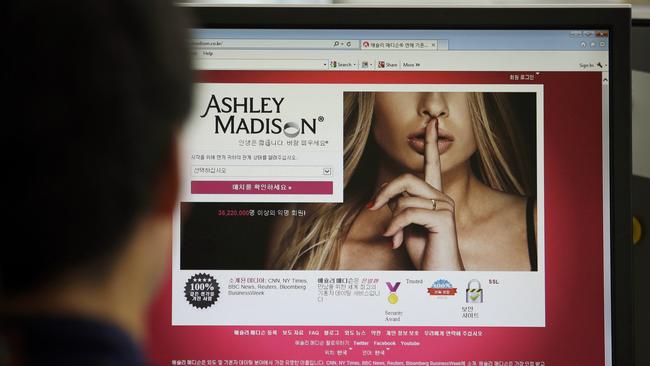Caught up in the Ashley Madison hack? Here’s what you need to do
VICTIMS of the Ashley Madison hack have already faced awkward consequences, but this could be even more painful.
HAVE you been caught up in the Ashley Madison hack?
There’s a very real chance you could fall victim to defamation, identity theft or even blackmail. Lachlan Jarvis, managing director of private investigation firm Lyonswood, explains what you need to know.
***
THERE are two main types of risks posed to people whose details are listed on the Ashley Madison data dump. The first risk could be categorised as reputational, that is, the prospect that a person’s social standing could suffer harm. The second type of risk is the danger that the person will suffer real loss, whether it be in the form of damage to finances, property or credit histories.
REPUTATIONAL RISK
Dealing with the first risk is perhaps more straightforward than people might suspect. As some writers have pointed out online, just because your details are listed does not mean you signed up, used or even had knowledge of the Ashley Madison account. And it certainly doesn’t mean you cheated on your partner.
Verification of email accounts was not required so any email address could be used with any name to create a user account. Stolen credit cards are readily available online and, given the site’s lax security, who knows what level of credit card owner verification was employed. With a little bit of homework, it’s not necessarily difficult to build a profile of a person and use that person’s identity as a dating site persona for example.
As private investigators, we are often asked to obtain evidence that a person is engaged in infidelity. There is only one form of proof that is ultimately going to result in peace of mind and that is video evidence of the suspect partner meeting and showing affection towards another person.
SMS or Facebook messages may raise some questions about a person’s behaviour but that’s all they will do because they’re entirely subject to contextual interpretation. We tell our clients that confronting cheating partners — who won’t tell the truth — with anything less than actual proof will actually leave you in a worse position. This is because the cheater will simply deny your accusations and ensure they are far more careful when they cheat next time.
The Ashley Madison information is in a similar category. At best, it’s tenuous evidence. If it’s used as the source of online or emailed defamatory statements about you, you should feel comfortable that you can rightly say that the leaked data is NOT evidence of any wrongdoing on your part and the onus is not on you to prove anything.
I don’t purport to offer expert relationship advice so professional help should be sought where required to deal with difficulties arising in an intimate relationship as a result of the data breach.

REAL RISK
What is perhaps more concerning than reputational damage is the fact that people who have their details listed on the Ashley Madison database are faced with problems they may not anticipate.
Firstly, there is the risk of blackmail. Someone who takes a moralistic view of infidelity might seek to engage in such practices. We worked on a Supreme Court matter in 2013 where our client was blackmailed anonymously by a person who discovered he was having an affair so it can certainly happen.
Secondly, you could be subject to hacking attempts through the email account you have listed. There are already scams documented online whereby scammers are targeting those listed on Ashley Madison with malware.
Thirdly, and in my view the most concerning thing, is the risk of identity theft. If you have used Ashley Madison or if someone has used your details on the site, you might be vulnerable because your key details are now all in one place and accessible. An opportunistic identity fraudster might take this opportunity to set up bank accounts or register companies under your name. This is where your credit history can suffer.
If you are listed in the hacked information, to manage the above risks some basic strategies should be employed.
You should take down as much other online information about yourself as possible. Time to deactivate your social media accounts and ask your employer to remove your profile from the company website where possible. Do a detailed Google search and determine what additional details a blackmailer or identity thief could uncover about you. Do your best to get that content down.

Someone wanting to blackmail you, defame you or steal your identity will be looking for as many details as possible so as to build a profile they can use. Relationships you have will be useful as they can threaten to pass on details about your alleged infidelity to your friends, family and work colleagues if those persons can be identified.
Contact your bank and discuss with them what has happened. If you used your own credit card to access Ashley Madison, ensure it is deactivated. You should discuss with your bank ways in which the information that is now in the public domain could be used to set up accounts in your name and ways you can minimise the risk of this happening. If the bank’s advice is that you are vulnerable, you should consider contacting other financial institutions and advising them that you do not intend to open accounts with them in the near future.
Likewise, contact ASIC and advise them you do not intend to register a company in the near future.
Periodically do Google searches under your name to determine whether your details are being used in any improper manner. For example, if someone sets up a Facebook account using your details then you should contact Facebook and get it taken down immediately.
Be very careful with any email account listed on the data dump. If you still access this email account, ensure you are not opening emails that could be phishing scams or contain malware.
If a blackmail or identity fraud attempt is made, you will need to report this to the police. The police have limited resources so you may need help from the private sector to endeavour to identify the culprit. We were successful in identifying an online blackmailer in the Supreme Court and assisting our client to recover money in this infidelity blackmail matter so there are in some circumstances options available to victims.
Lachlan Jarvis is managing director of Lyonswood Investigations
Originally published as Caught up in the Ashley Madison hack? Here’s what you need to do


